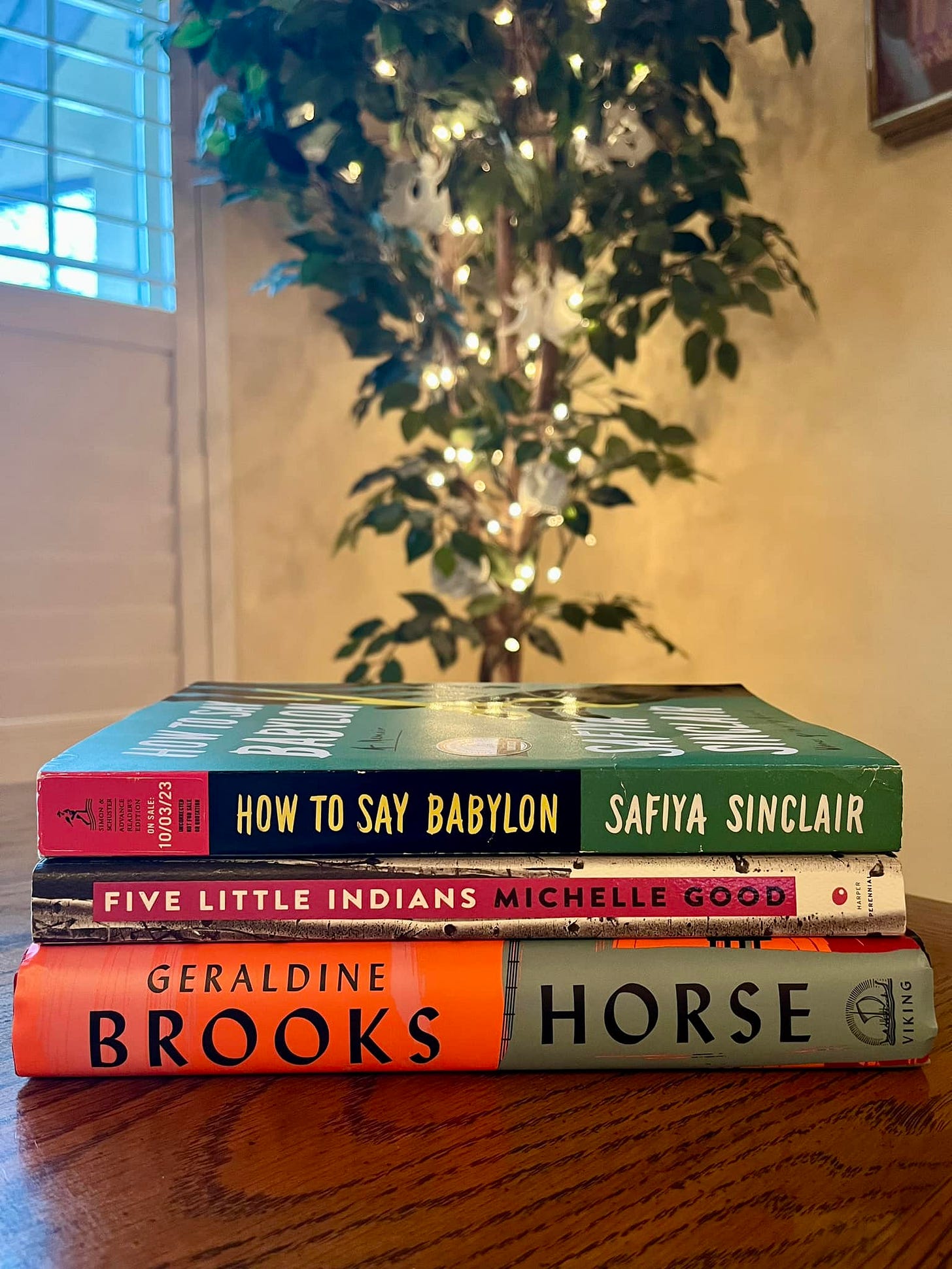Welcome back to my Top 20 Reads of '23. Yesterday I shared the second ten books on my list, the Honorable Mentions. I'll begin the Top 10 with the bottom three.
Coming in at number 10 is Geraldine Brooks' latest work of historical fiction, Horse. As with her earlier People of the Book, Brooks shows us the connections among people and events across time. In 1850, an enslaved groom named Jarret bonds with a horse that will become a legend in the South. In 1954, a New York City gallery owner is fascinated by a mysterious 19th century painting of the horse. And in 1994, a scientist and an art historian are studying the record-breaking thoroughbred Lexington. Horse is a complex examination of race, science, art, and obsession. Brooks is a gifted storyteller and one of the best writers of historical fiction. (Horse won the Anisfield-Wolf Book Award and the Dayton Literary Peace Prize.)
Ninth place goes to Five Little Indians by Canadian writer Michelle Good, which deserves much more attention, at least outside of Canada (it was published in 2020 and has won several awards). It’s the riveting story of five Indian children taken from their families by the government to have their Indian heritage and culture replaced by mainstream white Catholic culture at an isolated residential school run by the Catholic Church. Good tells us their individual stories, immerses us in the brutal environment of the residential school (think re-education camp), and then follows them in the years after their release (or in one case, escape). The trauma they endured haunts them in varying ways, with sone managing to find a little peace of mind and to forge ahead better than others. Indian Residential Schools and their attempts to erase First Nations and Native American culture are an inexcusable racist black mark on the history of Canada and the United States. (I also recommend Stealing by Margaret Verble for an American version of this sad tale focusing on one girl.)
In eighth place, we have the only memoir on this year's list (I only read a few each year), How to Say Babylon, poet Safiya Sinclair’s memoir of her upbringing in a strict Rastafarian family in Jamaica. She describes with unblinking honesty what it was like growing up in a house ruled by her tyrannical, misogynistic father, a wild-eyed fundamentalist adherent of Rastafarianism. Her mother saved her by providing her with books on the sly, at great risk to both of them. How to Say Babylon also stands out for the hypnotic quality of Sinclair’s prose (not surprisingly) and its powerful sense of place. Eventually, Sinclair escapes to the U.S., where her incisive mind and aesthetic sensibility combine to make her a standout student and award-winning writer. In 2016, she published her debut poetry collection, Cannibal. How to Say Babylon is an exceptionally absorbing and compelling read. Highly recommended.
James McBride's The Heaven & Earth Grocery Store won the Kirkus Prize for Fiction and was named Book of the Year by both Amazon and Barnes & Noble. It opens with the discovery in 1972 of a skeleton during the renovation of an old building in Pottstown, Pennsylvania. From there we move back to the 1920s for the story of two marginalized communities. The Black residents, who live on Chicken Hill are, over time, joined by Jewish immigrants trying to build a new life. Moshe takes over a run-down theater and integrates it by bringing in Black jazz and dance bands, while his wife, the formidable Chona, daughter of the town's first rabbi, runs the small corner grocery store beneath their apartment. Before long, they have built relationships with their Black neighbors, largely through Moshe's friendship with the janitor at his theater, Nate Timblin, one of the leaders of the community. At the same time, we observe the contrasting interactions of the White community with the residents of Chicken Hill, whether it's the town doctor who leads the local chapter of the KKK or local businessmen and politicians. The shaggy dog story of the Hill's many quirky characters kicks into gear when Moshe and Chona agree to hide a deaf boy who local authorities are trying to institutionalize. The Black and Jewish communities work together to protect him, reminding us that love in action can save not just one boy, but all of us.
Parini Shroff's debut, The Bandit Queens is set in a village in India where things are about to get strange -- and then change. When Geeta’s abusive husband disappears, residents of her village believe she killed him. When she realizes they now respect and fear her, she keeps the truth to herself. But when a woman asks her to help murder her abusive husband, she reluctantly agrees. Thus begins a darkly hilarious story of a group of Indian women fighting back against widespread misogyny and taking control of their own lives. Geeta is inspired by the exploits of the actual Bandit Queen, Phoolan Devi, a lower caste Robin Hood who went on to become a politician before being assassinated in 2001 at age 37. The Bandit Queens is both a story of the power and complexity of female friendship and the injustices caused by India’s caste system, sexism, and corruption. Although it has serious things on its mind, it reads like a revenge thriller and is further enlivened by some very funny dialogue. Shroff, a Bay Area attorney, has written an impressive debut that will keep readers turning the pages to find out what crazy thing will happen next.
The Top 5 begins with Susan Straight's Mecca, a books that has not received the acclaim it deserves. While James McBride and Parini Shroff lighten their exploration of serious matters with large doses of humor, Straight favors a sort of contemporary California noir. Mecca braids three narratives concerning the harsh reality of working-class life in Southern California, where the so-called glamour of places like Hollywood, Beverly Hills, and Santa Monica are irrelevant. As a lifelong Californian, Straight knows well the sprawling suburbs, mountain canyons, and desolate deserts of eastern Los Angeles County, as well as the Inland Empire of Riverside County, which runs to the east and south of Los Angeles. Mecca follows a Hispanic police officer patrolling the endless freeways on his motorcycle; Mexican immigrants struggling to make a living at a desert resort, and a Black family whose young son gets caught up in an act of violence. Straight writes with insight and empathy as she slowly brings the three narrative strands together, revealing the connections among these characters’ lives.
Tomorrow, I'll reveal my choices for second through fourth places and my favorite book of the year. Care to take a guess what books they'll be?




